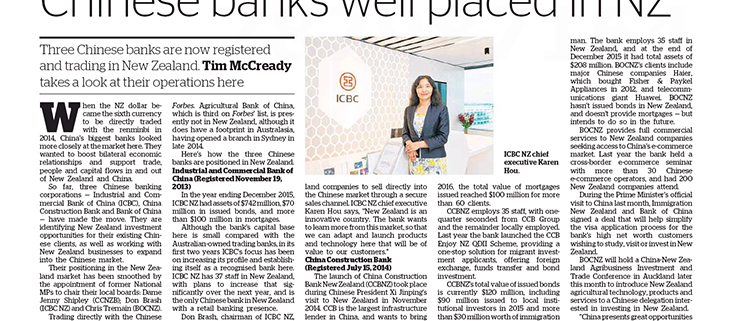http://nzh.tw/11632917
Tim McCready
Three Chinese banks are now registered and trading in New Zealand.
When the NZ dollar became the sixth currency to be directly traded with the renminbi in 2014, China’s biggest banks looked more closely at the market here. They wanted to boost bilateral economic relationships and support trade, people and capital flows in and out of New Zealand and China.
So far, three Chinese banking corporations — Industrial and Commercial Bank of China (ICBC), China Construction Bank and Bank of China — have made the move. They are identifying New Zealand investment opportunities for their existing Chinese clients, as well as working with New Zealand businesses to expand into the Chinese market.
Their positioning in the New Zealand market has been smoothed by the appointment of former National MPs to chair their local boards: Dame Jenny Shipley (CCNZB); Don Brash (ICBC NZ) and Chris Tremain (BOCNZ).
Trading directly with the Chinese renminbi removed the requirement and associated cost of conversion through the US dollar — a significant benefit for importers and exporters.
ICBC, the largest bank in the world by total assets and market capitalisation, was the first to set up in Auckland in 2014, followed by China Construction Bank and Bank of China. All three are among the largest four global public companies as ranked by Forbes. Agricultural Bank of China, which is third on Forbes’ list, is presently not in New Zealand, although it does have a footprint in Australasia, having opened a branch in Sydney in late 2014.
Here’s how the three Chinese banks are positioned in New Zealand.
Industrial and Commercial Bank of China (Registered November 19, 2013)
In the year ending December 2015, ICBC NZ had assets of $742 million, $70 million in issued bonds, and more than $100 million in mortgages.
Although the bank’s capital base here is small compared with the Australian-owned trading banks, in its first two years ICBC’s focus has been on increasing its profile and establishing itself as a recognised bank here. ICBC NZ has 37 staff in New Zealand, with plans to increase that significantly over the next year, and is the only Chinese bank in New Zealand with a retail banking presence.
Don Brash, chairman of ICBC NZ, says: “During ICBC’s start-up phase, the investment required in people, systems, profile and marketing has been significant. It’s not surprising that we’re not in profit yet, but we aim to as soon as possible.”
ICBC introduced its e-commerce platform to the New Zealand market late last year and has had over 4500 transactions since its launch. The “E-mall” allows reputable New Zealand companies to sell directly into the Chinese market through a secure sales channel. ICBC NZ chief executive Karen Hou says, “New Zealand is an innovative country. The bank wants to learn more from this market, so that we can adapt and launch products and technology here that will be of value to our customers.”
China Construction Bank (Registered July 15, 2014)
The launch of China Construction Bank New Zealand (CCBNZ) took place during Chinese President Xi Jinping’s visit to New Zealand in November 2014. CCB is the largest infrastructure lender in China, and wants to bring this expertise to New Zealand. Its local chairman Dame Jenny Shipley has also served on the parent company’s board.
CCBNZ’s total assets reached more than $400 million at the end of December 2015, with around $300 million coming from loans and advances, 75 per cent of which are to local blue chip companies and small and medium enterprises. At March 31, 2016, the total value of mortgages issued reached $100 million for more than 60 clients.
CCBNZ employs 35 staff, with one-quarter seconded from CCB Group and the remainder locally employed. Last year the bank launched the CCB Enjoy NZ QDII Scheme, providing a one-stop solution for migrant investment applicants, offering foreign exchange, funds transfer and bond investment.
CCBNZ’s total value of issued bonds is currently $120 million, including $90 million issued to local institutional investors in 2015 and more than $30 million worth of immigration bonds. CCBNZ doesn’t plan to operate any retail branches here. Instead the bank does a significant amount of marketing through Chinese social media and New Zealand’s most popular Chinese website, Skykiwi.
Bank of China (Registered 21 November 2014)
BOCNZ was launched here in November 2014, with former National Party minister Chris Tremain as chairman. The bank employs 35 staff in New Zealand, and at the end of December 2015 it had total assets of $208 million. BOCNZ’s clients include major Chinese companies Haier, which bought Fisher & Paykel Appliances in 2012, and telecommunications giant Huawei. BOCNZ hasn’t issued bonds in New Zealand, and doesn’t provide mortgages — but intends to do so in the future.
BOCNZ provides full commercial services to New Zealand companies seeking access to China’s e-commerce market. Last year the bank held a cross-border e-commerce seminar with more than 30 Chinese e-commerce operators, and had 200 New Zealand companies attend.
During the Prime Minister’s official visit to China last month, Immigration New Zealand and Bank of China signed a deal that will help simplify the visa application process for the bank’s high net worth customers wishing to study, visit or invest in New Zealand.
BOCNZ will hold a China-New Zealand Agribusiness Investment and Trade Conference in Auckland later this month to introduce New Zealand agricultural technology, products and services to a Chinese delegation interested in investing in New Zealand.
“China presents great opportunities for New Zealand agribusiness to produce and export more, but companies here need the right partner to support them in making that first step,” says David Lei Wang, BOCNZ chief executive. “By hosting 70 Chinese agricultural companies here, we aim to introduce local agribusinesses to people who can potentially help them access the Chinese market and grow their business,” he says.




Leave a Reply
Want to join the discussion?Feel free to contribute!